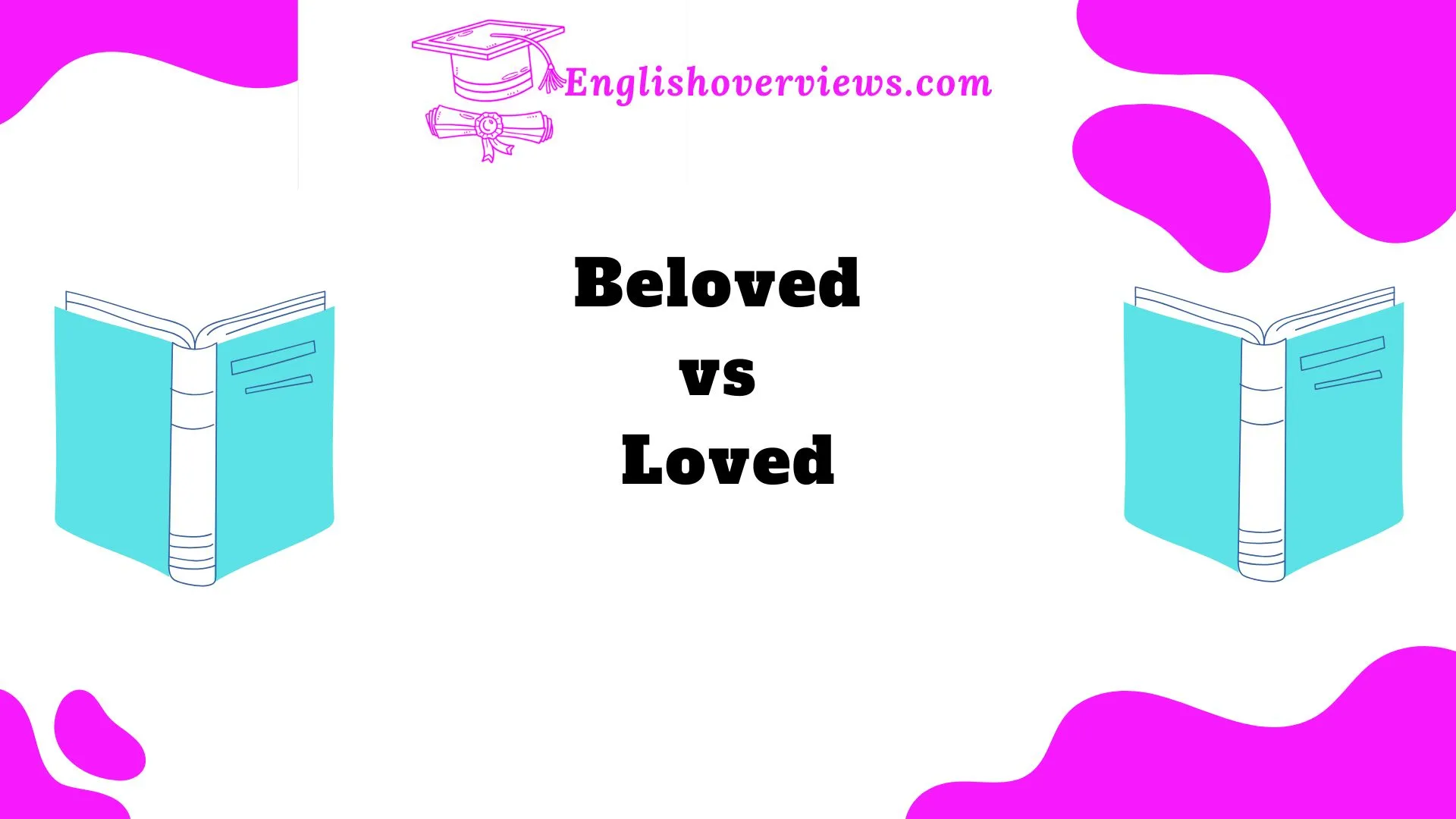When it comes to expressing affection, the English language offers a variety of words to convey warmth and care. Among these, the words beloved and loved stand out. But what’s the real difference between them?
While they both refer to feelings of deep affection, the emotional weight, context, and intensity of these words differ significantly.
Understanding how and when to use beloved vs. loved can improve your communication, whether you’re writing, speaking, or even analyzing literature.
In this article, we’ll explore the unique emotional depth of each word, how context shapes their meaning, and provide practical examples to illustrate the nuances.
By the end, you’ll not only grasp the distinction between these two words but also know when to use each for maximum impact.
Let’s dive in and uncover the real emotional layers behind beloved and loved.
The Core Meaning: ‘Beloved’ vs. ‘Loved’
Before we dive into the emotional depth and context of each word, it’s essential to first understand their basic meanings. While both words express affection, they differ significantly in intensity.
‘Loved’
The word loved is often used in everyday language and implies general affection. It’s flexible and can be used in a wide variety of contexts. When you say someone is loved, you’re indicating that the person holds a special place in your heart—but it doesn’t necessarily carry the same weight as beloved.
For example, we often say “I loved that movie” or “You are loved by many.” It’s common, warm, and familiar.
‘Beloved’
On the other hand, beloved is a word that carries a much deeper emotional significance. It’s not something you throw around casually. The word conveys intimacy, reverence, and a sense of timeless affection. It’s often reserved for those who hold an irreplaceable position in your heart.
For instance, “My beloved partner” speaks to a lasting bond, while “He is beloved by his community” implies deep admiration and affection from a larger group.
Emotional Depth: How ‘Beloved’ Carries a Heavier Weight
The emotional depth of these two words is where things get interesting. Let’s break it down:
‘Loved’
When you describe someone as loved, it’s typically a positive emotion, but there’s less intensity. You might love someone like a close friend, a family member, or a favorite celebrity. It’s a safe term, applicable to a variety of relationships, and doesn’t necessarily imply that the relationship is the most important thing in your life.
Real-World Example:
- “He was loved by his colleagues.” This implies that he was well-liked and cared for, but not necessarily deeply adored by everyone.
‘Beloved’
This term carries with it a weight of reverence and admiration. It often suggests that the person or thing is irreplaceable, and the feeling of affection is profound and enduring. It’s a word reserved for relationships that go beyond casual affection—such as for someone you would never forget, no matter how much time passes.
Real-World Example:
- “She was the beloved leader of her people.” This speaks to her enduring influence and the admiration she commanded.
Contextual Usage: When to Choose ‘Beloved’ Over ‘Loved’
‘Beloved’ in Literature and Culture
The word beloved isn’t just about love—it’s deeply embedded in literature, art, and history. When authors use the term, they often intend to express something eternal and sacred about the relationship.
Think of Toni Morrison’s Beloved, where the term is used to describe a haunting and profound connection between the characters and their history.
In fact, many writers choose beloved because it creates a sense of timelessness, as if the subject’s importance will never fade. Culturally, the word is often used to evoke deep respect or reverence.
Examples in Literature and Culture:
- Shakespeare: “My dear beloved” was a common expression of eternal affection.
- Religious texts: Terms like “beloved child of God” or “beloved disciple” signify someone worthy of veneration.
When to Use ‘Loved’ in Everyday Language
Loved, on the other hand, is everyday language. You use it when you want to express affection, but without the heightened emotional stakes. Whether it’s for a friend, family member, or pet, loved fits most occasions without any grand emotional declaration. It’s versatile and doesn’t carry the heavy, reverential tone that beloved does.
Examples in Everyday Conversations:
- “I loved spending the day with you.”
- “My dog is always loved at home.”
The Role of ‘Beloved’ in Literature and Culture
Literary Impact of ‘Beloved’
When used in literature, the word beloved often carries a sense of longing or sacrifice. It’s used to show deep, eternal connections. Take the famous novel Beloved by Toni Morrison, where the term is used to refer to both the physical and emotional return of a loved one.
Here, beloved isn’t just a word—it’s an entire theme of loss, reconnection, and trauma.
The impact of the word in this context is incredibly deep. It’s a symbolic way to show a lasting bond between the character and the ones they hold dear.
Quote:
- “Beloved is the one who never truly leaves. She is always there, a part of you, always loved, always beloved.”
Cultural Significance of ‘Beloved’
In cultural terms, the word beloved signifies devotion and esteem. You’ll often find it used in speeches, songs, or tributes to elevate someone’s importance.
‘Loved’ in Everyday Language: Flexibility and Casual Affection
As we mentioned earlier, loved is the go-to word for most everyday interactions. Whether you’re describing your feelings for a person, a piece of art, or even a moment in time, loved fits. It’s the word we turn to when we want to convey warmth and positive emotion but don’t need to add too much weight.
Common Phrases Using ‘Loved’:
- “He’s always been loved by his family.”
- “She loved the new restaurant in town.”
In these contexts, ‘loved’ isn’t about deep emotional resonance; it’s simply a way to acknowledge positive feelings.
Practical Comparison: Side-by-Side Examples of ‘Beloved’ and ‘Loved’ in Action
Let’s look at some side-by-side examples to highlight the differences between beloved and loved.
| Phrase | ‘Loved’ | ‘Beloved’ |
| In relationships | “She is loved by her friends.” | “She is my beloved wife.” |
| In a community | “He was loved by his fans.” | “He is the beloved leader.” |
| In a casual setting | “The movie was loved by critics.” | “The beloved novel was on every shelf.” |
| In an emotional bond | “You are loved by your family.” | “You are my beloved child.” |
These examples show how loved is more widely applicable, while beloved is used when the affection is meant to feel profound and enduring.
The Psychological and Social Implications of ‘Beloved’ vs. ‘Loved’
The words we choose to express affection can carry psychological weight. When you call someone beloved, you’re signaling that they are important to you in a lasting, almost sacred way. It’s a term that implies commitment and reverence.
Psychological Impact of ‘Beloved’
- Sense of permanence: Calling someone beloved often implies that they will never be forgotten, even in the face of death or separation.
- Psychological reverence: It elevates the person to a unique status in your life, suggesting a sacred and long-lasting bond.
Psychological Impact of ‘Loved’
- Warmth without depth: Saying someone is loved communicates care but not necessarily an indelible connection.
- Flexibility: It works for a variety of relationships, but doesn’t signal that someone holds a special or exclusive place in your life.
Conclusion: Choosing the Right Word for the Right Moment
The difference between beloved and loved lies in the depth and context in which the words are used. Loved is a general, flexible term that conveys positive emotion, while beloved speaks to a profound, lasting connection that can transcend time.
When deciding between the two, think about the emotional weight you want to convey. Are you simply expressing affection, or are you elevating someone to the status of someone truly irreplaceable?
FAQs
1. Can I use ‘beloved’ casually?
No, beloved is a word with deep emotional significance, and it’s usually reserved for people or things that hold a special, lasting place in your heart.
2. Is ‘loved’ less intense than ‘beloved’?
Yes, loved conveys affection, but without the reverence and lasting emotional connection that beloved carries.
3. When should I use ‘beloved’ in writing?
Use beloved when you want to evoke a timeless bond or deep emotional connection. It’s often used in literary, poetic, or formal contexts.
4. Can I use ‘loved’ for casual relationships?
Absolutely! Loved is perfect for everyday use in both casual and more personal relationships.

Alyan Ashraf is the creative mind behind English Overviews, a platform dedicated to helping learners master the English language. Passionate about education and language development, Alyan specializes in simplifying complex English concepts, making learning accessible for students of all levels.











